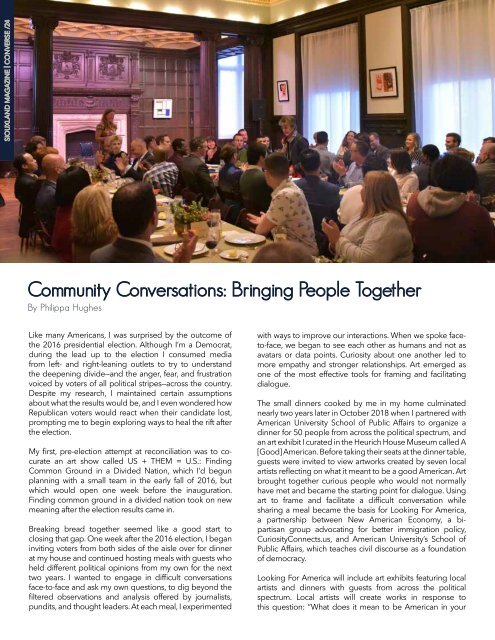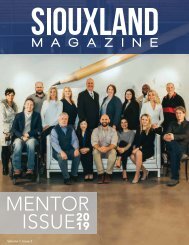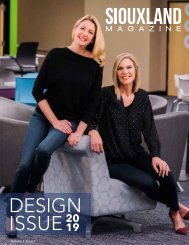Create successful ePaper yourself
Turn your PDF publications into a flip-book with our unique Google optimized e-Paper software.
<strong>Siouxland</strong> <strong>Magazine</strong> | Converse /24<br />
Community Conversations: Bringing People Together<br />
By Philippa Hughes<br />
Like many Americans, I was surprised by the outcome of<br />
the 2016 presidential election. Although I’m a Democrat,<br />
during the lead up to the election I consumed media<br />
from left- and right-leaning outlets to try to understand<br />
the deepening divide—and the anger, fear, and frustration<br />
voiced by voters of all political stripes—across the country.<br />
Despite my research, I maintained certain assumptions<br />
about what the results would be, and I even wondered how<br />
Republican voters would react when their candidate lost,<br />
prompting me to begin exploring ways to heal the rift after<br />
the election.<br />
My first, pre-election attempt at reconciliation was to cocurate<br />
an art show called US + THEM = U.S.: Finding<br />
Common Ground in a Divided Nation, which I’d begun<br />
planning with a small team in the early fall of 2016, but<br />
which would open one week before the inauguration.<br />
Finding common ground in a divided nation took on new<br />
meaning after the election results came in.<br />
Breaking bread together seemed like a good start to<br />
closing that gap. One week after the 2016 election, I began<br />
inviting voters from both sides of the aisle over for dinner<br />
at my house and continued hosting meals with guests who<br />
held different political opinions from my own for the next<br />
two years. I wanted to engage in difficult conversations<br />
face-to-face and ask my own questions, to dig beyond the<br />
filtered observations and analysis offered by journalists,<br />
pundits, and thought leaders. At each meal, I experimented<br />
with ways to improve our interactions. When we spoke faceto-face,<br />
we began to see each other as humans and not as<br />
avatars or data points. Curiosity about one another led to<br />
more empathy and stronger relationships. Art emerged as<br />
one of the most effective tools for framing and facilitating<br />
dialogue.<br />
The small dinners cooked by me in my home culminated<br />
nearly two years later in October 2018 when I partnered with<br />
American University School of Public Affairs to organize a<br />
dinner for 50 people from across the political spectrum, and<br />
an art exhibit I curated in the Heurich House Museum called A<br />
[Good] American. Before taking their seats at the dinner table,<br />
guests were invited to view artworks created by seven local<br />
artists reflecting on what it meant to be a good American. Art<br />
brought together curious people who would not normally<br />
have met and became the starting point for dialogue. Using<br />
art to frame and facilitate a difficult conversation while<br />
sharing a meal became the basis for Looking For America,<br />
a partnership between New American Economy, a bipartisan<br />
group advocating for better immigration policy,<br />
CuriosityConnects.us, and American University’s School of<br />
Public Affairs, which teaches civil discourse as a foundation<br />
of democracy.<br />
Looking For America will include art exhibits featuring local<br />
artists and dinners with guests from across the political<br />
spectrum. Local artists will create works in response to<br />
this question: “What does it mean to be American in your




